

Ethical Online Behavior. Digital Citizenship: Parents. Pornography and Sexting. Digital Citizenship. Rock Your Searches With the “site:” Operator. Just a quick post today, sharing one my favorite web search engine techniques.
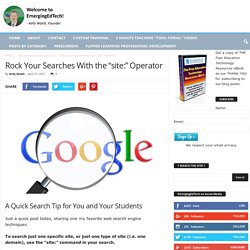
To search just one specific site, or just one type of site (i.e. one domain), use the “site:” command in your search. Here are some examples … To search just education sites, include “site:edu” in your search. Check your grammar and more. Media Literacy: Five Ways Teachers Are Fighting Fake News. As the national attention to fake news and the debate over what to do about it continue, one place many are looking for solutions is in the classroom.
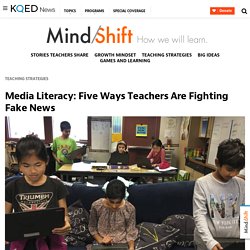
Since a recent Stanford study showed that students at practically all grade levels can’t determine fake news from the real stuff, the push to teach media literacy has gained new momentum. The study showed that while students absorb media constantly, they often lack the critical thinking skills needed to tell fake news from the real stuff. Teachers are taking up the challenge to change that. NPR Ed put out a social media call asking how educators are teaching fake news and media literacy, and we got a lot of responses. Here’s a sampling from around the country: Fake news “Simon Says” In Scott Bedley’s version of Simon Says, it’s not those two magic words that keep you in the game, but deciding correctly whether a news story is real or not. 1. Subtle changes. Overcoming 10 Common Obstacles of Game-Based Teaching. Game-based teaching is an exciting adventure for any teacher to embark on with their students.
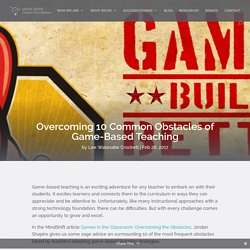
It excites learners and connects them to the curriculum in ways they can appreciate and be attentive to. Unfortunately, like many instructional approaches with a strong technology foundation, there can be difficulties. But with every challenge comes an opportunity to grow and excel. In the MindShift article Games in the Classroom: Overcoming the Obstacles, Jordan Shapiro gives us some sage advice on surmounting 10 of the most frequent obstacles faced by teachers adopting game-based learning strategies. The obstacles Shapiro guides us over were taken from a survey of 700 teachers conducted by the Games and Learning Publishing Council. FAKE NEWS.
Fake News, Satire, Propaganda. Learning in the digital age - theory and practice. Toolkit for Digitally-Literate Teachers. 96 percent of Americans use the internet daily, and 62 percent of working Americans rely on the internet to do their jobs.
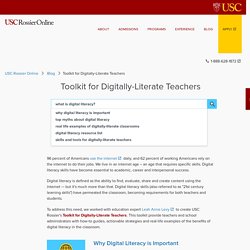
We live in an internet age – an age that requires specific skills. Digital literacy skills have become essential to academic, career and interpersonal success. Checklist: Skills and Tools for Digitally-Literate Teachers - Blog. 14 Resources to Bookmark for Digital Literacy - Blog. Digital Citizenship. Digital Citizenship & Safety. 8 digital skills we must teach our children. The social and economic impact of technology is widespread and accelerating.
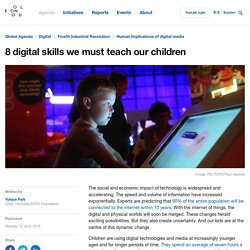
The speed and volume of information have increased exponentially. Experts are predicting that 90% of the entire population will be connected to the internet within 10 years. 5.e-Safety. Information Literacy Competency Standards for Higher Education. The Information Literacy Competency Standards for Higher Education (originally approved in 2000) were rescinded by the ACRL Board of Directors on June 25, 2016, at the 2016 ALA Annual Conference in Orlando, Florida, which means they are no longer in force.
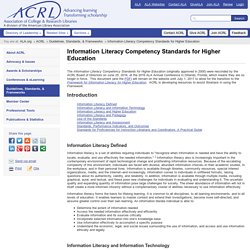
This document (and the PDF) will remain on the website until July 1, 2017 to allow for the transition to the Framework for Information Literacy for Higher Education. ACRL is developing resources to assist librarians in using the Framework. Introduction. Digital Citizenship Toolkits. Digital Citizenship: Resource Roundup. 11 Essential Digital Literacy Skills. K-12 Digital Citizenship Curriculum. Literacy in the Digital Age: Five Sites With High-Quality Informational Text. Editor’s Note: Teaching Channel has partnered with Student Achievement Partners on a blog series about digital literacy tools and their effective use by educators.
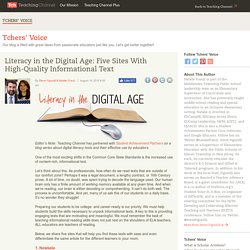
One of the most exciting shifts in the Common Core State Standards is the increased use of content-rich, informational text. Let’s think about this. As professionals, how often do we read texts that are outside of our comfort zone? Perhaps it was a legal document, a lengthy contract, or 16th Century prose. A lot of time, no doubt, was spent trying to decode the language used. The Hero Project: Authenticating Online Information. How to Teach the 9 Themes of Digital Citizenship Infographic. Teacher Infographics.
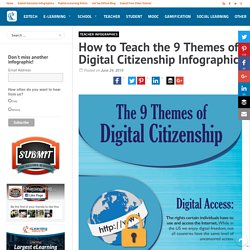
Developing students' digital literacy. The issue Even today’s students need support with some areas of digital practice, particularly in an academic context, so it’s important to make sure that these needs are met.
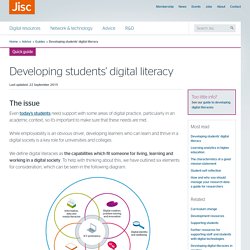
While employability is an obvious driver, developing learners who can learn and thrive in a digital society is a key role for universities and colleges. Edutopia. What Happens in One Minute on the Internet? [Infographic] As millions of new Internet users log on every month, the numbers relating to the flow of information becomes ever more staggering.
![What Happens in One Minute on the Internet? [Infographic]](http://cdn.pearltrees.com/s/pic/th/happens-internet-infographic-115175659)
An infographic from analytics software provider Domo, attempts to quantify just how much data is generated in one minute online. First thing’s first: Email is still a dominant sharing tool. Internet users send more than 200 million emails every minute. Searching Google is the second most-popular activity on the Web with more than four million queries every 60 seconds. Surprise, surprise: Facebook holds dominion when it comes to social networks, with users posting nearly 2.5 million pieces of content. Digital-id.wikispaces. Skip to main content Create interactive lessons using any digital content including wikis with our free sister product TES Teach. Get it on the web or iPad!
Guest. What is Digital Citizenship? CyberWise Digital Citizenship. Today we communicate through a powerful combination of words, images and sounds. Therefore, becoming "media literate" requires a new set of skills that enable us not only to comprehend, but also to create and distribute information across all mediums. Digital Literacies SEETA course. A Primer on Digital Literacy. Adapted from the book Digital Literacy by Paul Gilster (John Wiley & Sons, 1997) Introduction In the summer of 1996, renowned journalist Pierre Salinger wrote about a conspiracy surrounding the downing of TWA Flight 800. His proof? An e-mail message circulated on the Internet that purportedly originated from the former Safety Chairman of the Airline Pilots Association.
The e-mail message was of dubious origin and could not be corroborated by any serious evidence. Yet it was clever enough to take in Salinger. Digital Literacy Instructor Resources. Resources for Teaching Digital Literacy. Search Tools Search is the essential 21st century skill. Developing search literacy in students should be the priority of our education. Teachers and students need the ability, search tools and strategies to effectively mine for information, evaluate and validate information.
FindingEducation, it’s for teachers to find best education resources on the web , backed by FindingDulcinea’s hand-selected and professionally edited education resource library. Teachers can manage, organize and share their links, and create web-based assignment their students. K-12 Digital Citizenship Curriculum.